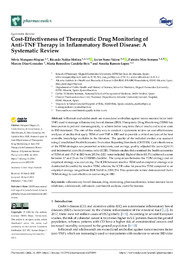Por favor, use este identificador para citar o enlazar este ítem:
https://hdl.handle.net/11000/34577Registro completo de metadatos
| Campo DC | Valor | Lengua/Idioma |
|---|---|---|
| dc.contributor.author | Marquez-Megias, Silvia | - |
| dc.contributor.author | nalda-molina, Ricardo | - |
| dc.contributor.author | Sanz Valero, Javier | - |
| dc.contributor.author | Más-Serrano, Patricio | - |
| dc.contributor.author | Diaz-Gonzalez, Marcos | - |
| dc.contributor.author | Candela-Boix, Maria Remedios | - |
| dc.contributor.author | Ramon-Lopez, Amelia | - |
| dc.contributor.other | Departamentos de la UMH::Ingeniería | es_ES |
| dc.date.accessioned | 2025-01-16T12:50:57Z | - |
| dc.date.available | 2025-01-16T12:50:57Z | - |
| dc.date.created | 2022-05 | - |
| dc.identifier.citation | Pharmaceutics 2022, 14, 1009 | es_ES |
| dc.identifier.issn | 1999-4923 | - |
| dc.identifier.uri | https://hdl.handle.net/11000/34577 | - |
| dc.description.abstract | Infliximab and adalimumab are monoclonal antibodies against tumor necrosis factor (antiTNF) used to manage inflammatory bowel disease (IBD). Therapeutic Drug Monitoring (TDM) has been proven to prevent immunogenicity, to achieve better long-term clinical results and to save costs in IBD treatment. The aim of this study was to conduct a systematic review on cost-effectiveness analyses of studies that apply TDM of anti-TNF in IBD and to provide a critical analysis of the best scientific knowledge available in the literature. The quality of the included studies was assessed using Consolidated Health Economic Evaluation Reporting Standards (CHEERS). Cost-effectiveness of the TDMstrategies was presented as total costs, cost savings, quality-adjusted life-years (QALY) and incremental cost-effectiveness ratio (ICER). Thirteen studies that examined the health economics of TDMofanti-TNF in IBD from 2013 to 2021 were included. Eight of them (61.5%) achieved a score between 17 and 23 on the CHEERS checklist. The comparison between the TDM strategy and an empirical strategy was cost saving. The ICER between reactive TDM and an empirical strategy was dominated (favorable) by reactive TDM, whereas the ICER value for proactive TDM compared to an empirical strategy ranged from EUR 56,845 to 3,901,554. This systematic review demonstrated that a TDMstrategy is cost-effective or cost-saving in IBD. | es_ES |
| dc.format | application/pdf | es_ES |
| dc.format.extent | 18 | es_ES |
| dc.language.iso | eng | es_ES |
| dc.publisher | MDPI | es_ES |
| dc.rights | info:eu-repo/semantics/openAccess | es_ES |
| dc.rights | Attribution-NonCommercial-NoDerivatives 4.0 Internacional | * |
| dc.rights.uri | http://creativecommons.org/licenses/by-nc-nd/4.0/ | * |
| dc.subject | inflammatory bowel diseases | es_ES |
| dc.subject | drug monitoring | es_ES |
| dc.subject | pharmacokinetics | es_ES |
| dc.subject | tumor necrosis factor inhibitors | es_ES |
| dc.subject | adalimumab | es_ES |
| dc.subject | infliximab | es_ES |
| dc.subject | cost–benefit analysis | es_ES |
| dc.subject | cost-effectiveness | es_ES |
| dc.subject.other | CDU::6 - Ciencias aplicadas::62 - Ingeniería. Tecnología | es_ES |
| dc.title | Cost-Effectiveness of Therapeutic Drug Monitoring of Anti-TNF Therapy in Inflammatory Bowel Disease: A Systematic Review | es_ES |
| dc.type | info:eu-repo/semantics/article | es_ES |
| dc.relation.publisherversion | https://doi.org/10.3390/ pharmaceutics14051009 | es_ES |

Ver/Abrir:
Artículo 1 (1).pdf
626,59 kB
Adobe PDF
Compartir:
 La licencia se describe como: Atribución-NonComercial-NoDerivada 4.0 Internacional.
La licencia se describe como: Atribución-NonComercial-NoDerivada 4.0 Internacional.
.png)